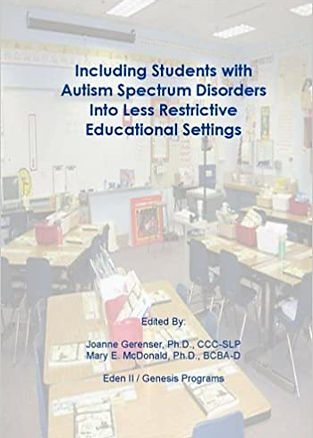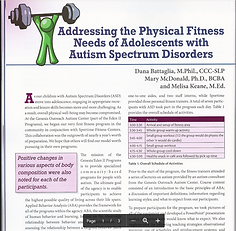
ABOUT

Dr. Mary E. McDonald is an expert in autism and applied behavior analysis (ABA). Dr. McDonald is a Professor in the Special Education Department at Hofstra University where she directs the Master of Science Program in ABA; Advanced Certificate Programs in ABA; Gifted Education; Assessment; and Special Education.
Dr. McDonald serves as the Associate Executive Director of Long Island Programs for Eden II/Genesis Programs. With over 30 years of experience, she has led programs supporting students with autism from early intervention through adulthood.
She earned her Ph.D. in Learning Theory at the CUNY Graduate Center and is a Board Certified Behavior Analyst at the doctoral level, as well as a licensed behavior analyst in New York and Connecticut. Dr. McDonald is an active member of several advisory and editorial boards in the field.

PUBLICATIONS
Dr. McDonald has published book chapters related to autism and special education on topics such as science-based interventions; distinguishing science and pseudoscience; components of behavioral teaching; 21st century learners; and a book about including students with autism.
PRESENTATIONS
-
Evidence-based Approaches to Autism
-
Adulting: Effectively Preparing Individuals with ASD
-
Assessment to Intervention: Enhancing Transition-Related Behavior
-
Developing Play Skills in Young Learners with ASD
-
Joint attention and Related Skills
-
Beyond Discrete Trial Instruction
-
Increasing Problem Solving, Creativity and Flexibility
-
Professional Behavior and Ethical Responsibility
-
Applied Behavior Analysis
-
Using Cognitive-Behavioral Strategies
-
Social Stories: What Does the Research Say?
-
Using Video Modeling to Promote Social Skills
-
Careers in Applied Behavior Analysis
-
Becoming a Leader in the Field of ABA
-
Creativity as a Behavioral Construct
.jpeg)
Peer Reviewed Publications
Pergament, B. & McDonald, M. E. (2022). Using behavioral momentum to
increase the rate of compliance in preschoolers with disabilities. Special Education Research, Policy & Practice
Didrichsen, S. & McDonald, M. E. (2022). Familiar vs. unfamiliar stimuli in multiple stimulus
preference assessments. Special Education Research, Policy & Practice, 6, 71-77.
Lindeman, K, McDonald, M.E., Lee, R, Gehshan, S. & Hoch, H. (2017). The effects of
visual cues, prompting and feedback within activity schedules on increasing cooperation between pairs of children with ASD. Special Education Research, Policy & Practice, 1 (1) 5-27.
Battaglia, D., & McDonald, M.E. (2016). Promoting conversation in students with autism spectrum disorders; Scripts and semantic mapping. Good Autism Practice, 40(1), 40-47.
McDonald, M.E., Battaglia, D., & Keane, M. (2015) Using Fixed-Interval based prompting to
increase a student’s initiation of PECS. Behavior Development Bulletin, 20 (2), 1-11.
Battaglia, D., & McDonald, M.E. (2015). Effects of the picture exchange communication
system (PECS) on maladaptive behavior in children with autism spectrum disorders
(ASD): A review of the literature. Journal of the American Academy of Special Education Professionals,
10 (1), 8-20.
McDonald, M. E., Reeve, S. A. & Sparacio, E. (2014). Using a tactile prompt to increase delivery of behavior-specific praise and token reinforcement and their collateral effects on stereotypic behavior in students with autism spectrum disorders. Behavior Development Bulletin, 19 (1), 40-44.
McDonald, M. E., Pace, D., Blue, E., & Schwartz, D. (2012). Critical Issues in Causation and
Treatment of Autism: Why Fads Continue to Flourish. Child & Family Behavior Therapy, 34(4), 290-304.
Schwartz, D., Blue, E., McDonald, M. E., & Pace, D. (2010). From inclusion to access: Paradigm shifts in special education. U.S.-China Education Review, 7 (8), 108-114.
Schwartz, D., Blue, E, & McDonald, M.E. Giuliani, G., Weber, G., Seirup, H., Rose, S, Elkis-Albuhoff, D. Rosenfeld, J. & Perkins, A. (2010). Dispelling stereotypes: Promoting disability awareness through film. Disability and Society, 25 (7), 841-848.
Schwartz, D., Blue, E., McDonald, M. E. & Pace, D. (2009). Teacher educators and response to intervention: A survey of knowledge, knowledge base, and program changes to teacher preparation programs. Journal of the American Academy of Special Education Professionals (JAASEP). 5-18.
McDonald, M. E. & Hemmes, N. (2003). Increases in social initiation toward an adolescent with autism: Reciprocity effects. Research in Developmental Disabilities, 24, 453-465.
Newman, B., Buffington, D. M., O’Grady, M. A., McDonald, M. E., Poulson, C. L.,& Hemmes, N. S. (1995).Self-management of schedule-following in three teenagers with autism. Behavioral Disorders, 20(3), 195-201.









